Comprehensive Business Environment Analysis: Wiser Company Report
VerifiedAdded on 2021/01/01
|9
|2153
|346
Report
AI Summary
This report provides a comprehensive analysis of the business environment, focusing on the Wiser Company. It begins with an introduction to the business environment and stakeholder analysis, differentiating between private, public, and charitable organizations. The report delves into the responsibilities of Wiser towards its stakeholders, including employees, customers, and the government, highlighting ethical and legal obligations. It then explores economic systems, including the impact of fiscal and monetary policies, and competition policies on the company. The report also examines market structures, pricing, and output decisions, as well as the influence of market forces and the cultural environment on organizational behavior. Furthermore, it assesses the significance of international trade to UK businesses and evaluates the impact of global factors and European Union policies on Wiser's operations. The report concludes with a summary of key findings and references supporting the analysis.
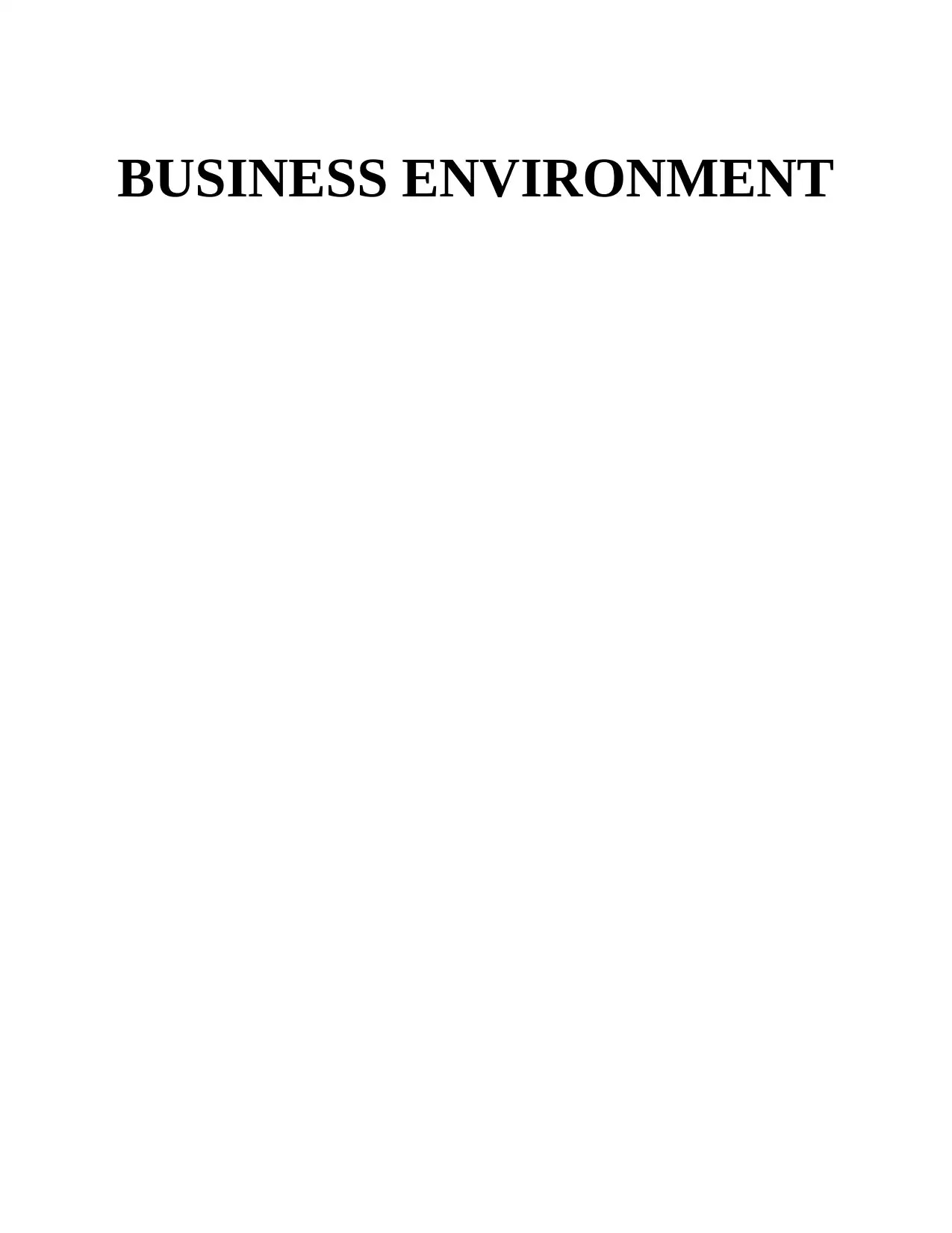
BUSINESS ENVIRONMENT
Paraphrase This Document
Need a fresh take? Get an instant paraphrase of this document with our AI Paraphraser
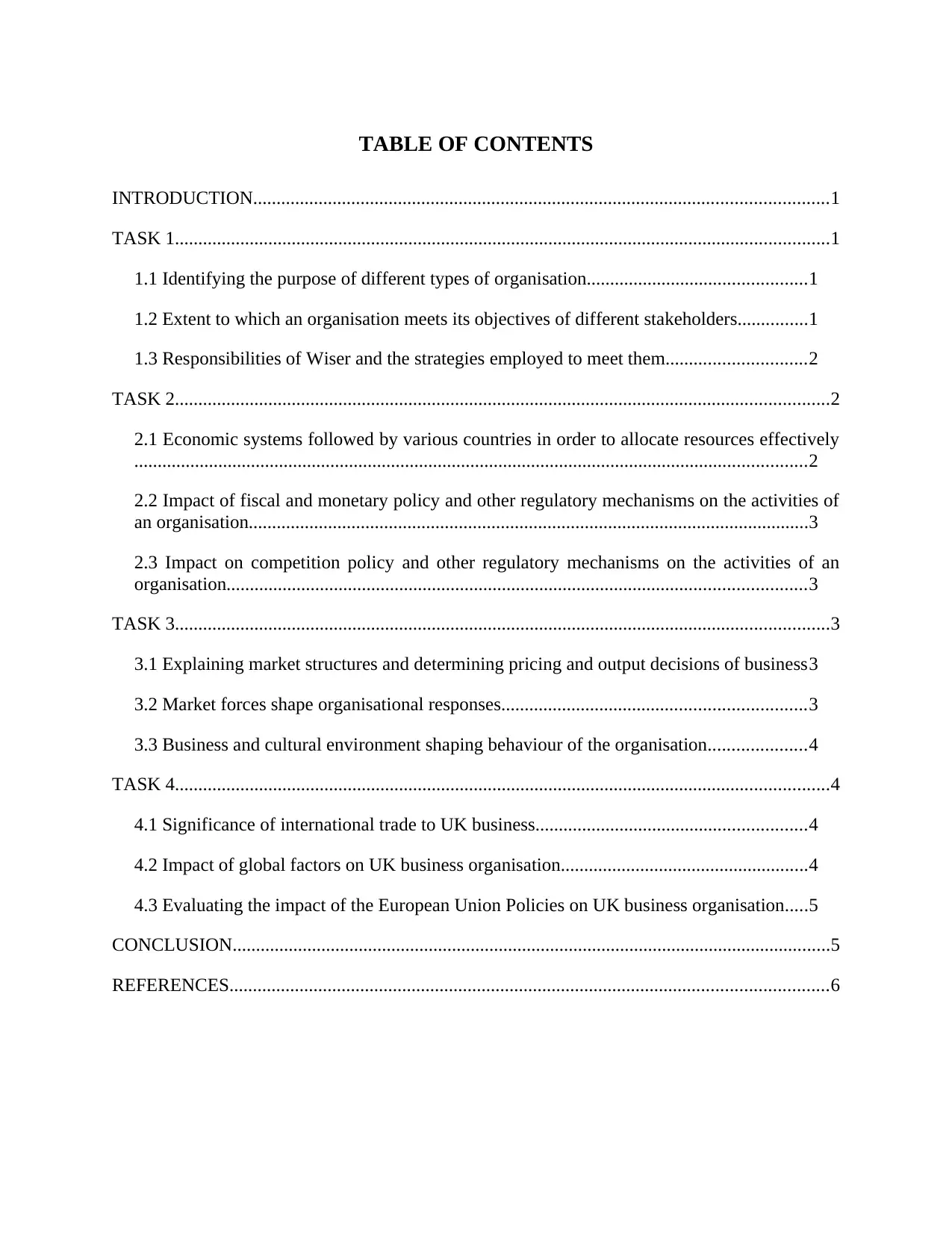
TABLE OF CONTENTS
INTRODUCTION...........................................................................................................................1
TASK 1............................................................................................................................................1
1.1 Identifying the purpose of different types of organisation...............................................1
1.2 Extent to which an organisation meets its objectives of different stakeholders...............1
1.3 Responsibilities of Wiser and the strategies employed to meet them..............................2
TASK 2............................................................................................................................................2
2.1 Economic systems followed by various countries in order to allocate resources effectively
................................................................................................................................................2
2.2 Impact of fiscal and monetary policy and other regulatory mechanisms on the activities of
an organisation........................................................................................................................3
2.3 Impact on competition policy and other regulatory mechanisms on the activities of an
organisation............................................................................................................................3
TASK 3............................................................................................................................................3
3.1 Explaining market structures and determining pricing and output decisions of business3
3.2 Market forces shape organisational responses.................................................................3
3.3 Business and cultural environment shaping behaviour of the organisation.....................4
TASK 4............................................................................................................................................4
4.1 Significance of international trade to UK business..........................................................4
4.2 Impact of global factors on UK business organisation.....................................................4
4.3 Evaluating the impact of the European Union Policies on UK business organisation.....5
CONCLUSION................................................................................................................................5
REFERENCES................................................................................................................................6
INTRODUCTION...........................................................................................................................1
TASK 1............................................................................................................................................1
1.1 Identifying the purpose of different types of organisation...............................................1
1.2 Extent to which an organisation meets its objectives of different stakeholders...............1
1.3 Responsibilities of Wiser and the strategies employed to meet them..............................2
TASK 2............................................................................................................................................2
2.1 Economic systems followed by various countries in order to allocate resources effectively
................................................................................................................................................2
2.2 Impact of fiscal and monetary policy and other regulatory mechanisms on the activities of
an organisation........................................................................................................................3
2.3 Impact on competition policy and other regulatory mechanisms on the activities of an
organisation............................................................................................................................3
TASK 3............................................................................................................................................3
3.1 Explaining market structures and determining pricing and output decisions of business3
3.2 Market forces shape organisational responses.................................................................3
3.3 Business and cultural environment shaping behaviour of the organisation.....................4
TASK 4............................................................................................................................................4
4.1 Significance of international trade to UK business..........................................................4
4.2 Impact of global factors on UK business organisation.....................................................4
4.3 Evaluating the impact of the European Union Policies on UK business organisation.....5
CONCLUSION................................................................................................................................5
REFERENCES................................................................................................................................6
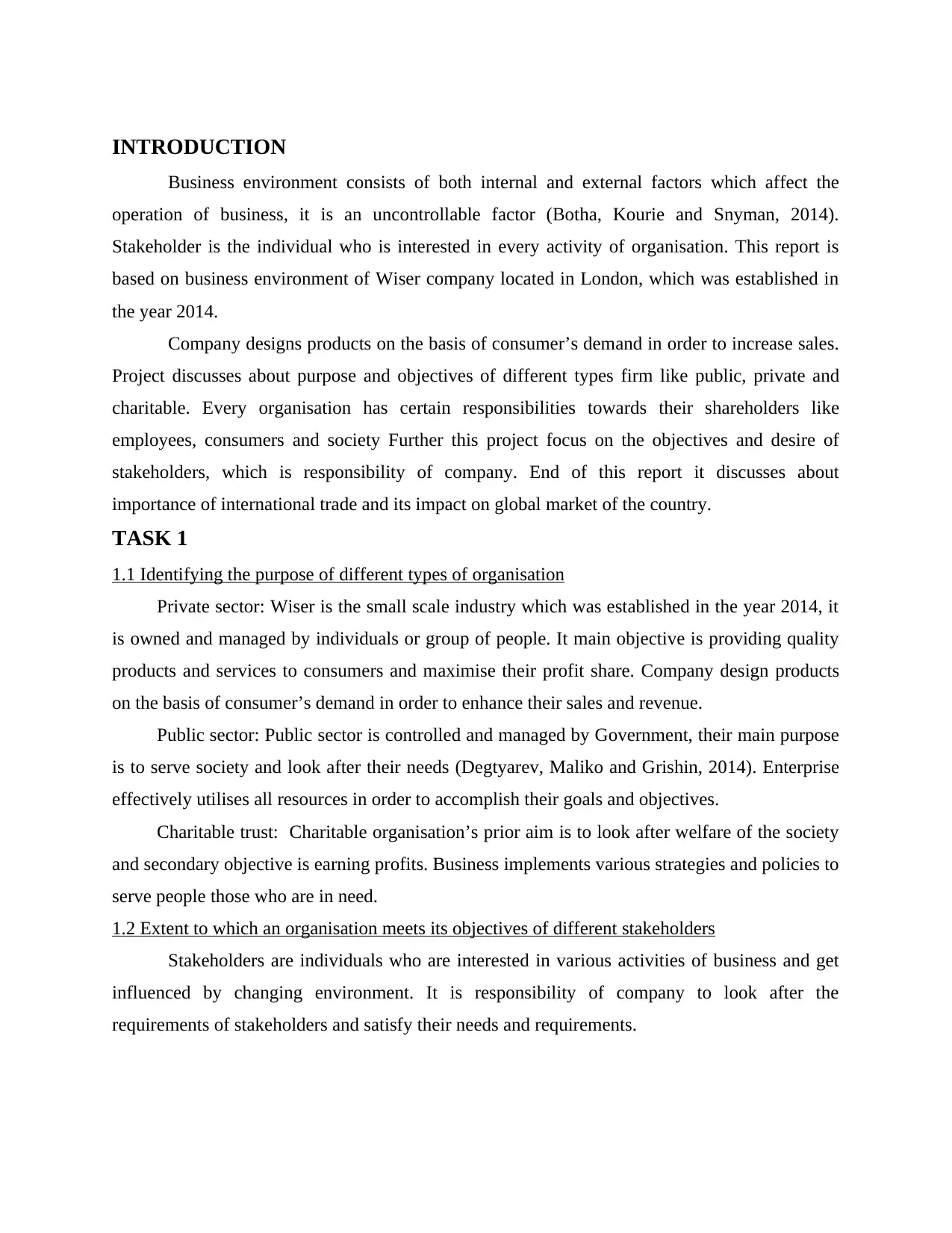
INTRODUCTION
Business environment consists of both internal and external factors which affect the
operation of business, it is an uncontrollable factor (Botha, Kourie and Snyman, 2014).
Stakeholder is the individual who is interested in every activity of organisation. This report is
based on business environment of Wiser company located in London, which was established in
the year 2014.
Company designs products on the basis of consumer’s demand in order to increase sales.
Project discusses about purpose and objectives of different types firm like public, private and
charitable. Every organisation has certain responsibilities towards their shareholders like
employees, consumers and society Further this project focus on the objectives and desire of
stakeholders, which is responsibility of company. End of this report it discusses about
importance of international trade and its impact on global market of the country.
TASK 1
1.1 Identifying the purpose of different types of organisation
Private sector: Wiser is the small scale industry which was established in the year 2014, it
is owned and managed by individuals or group of people. It main objective is providing quality
products and services to consumers and maximise their profit share. Company design products
on the basis of consumer’s demand in order to enhance their sales and revenue.
Public sector: Public sector is controlled and managed by Government, their main purpose
is to serve society and look after their needs (Degtyarev, Maliko and Grishin, 2014). Enterprise
effectively utilises all resources in order to accomplish their goals and objectives.
Charitable trust: Charitable organisation’s prior aim is to look after welfare of the society
and secondary objective is earning profits. Business implements various strategies and policies to
serve people those who are in need.
1.2 Extent to which an organisation meets its objectives of different stakeholders
Stakeholders are individuals who are interested in various activities of business and get
influenced by changing environment. It is responsibility of company to look after the
requirements of stakeholders and satisfy their needs and requirements.
Business environment consists of both internal and external factors which affect the
operation of business, it is an uncontrollable factor (Botha, Kourie and Snyman, 2014).
Stakeholder is the individual who is interested in every activity of organisation. This report is
based on business environment of Wiser company located in London, which was established in
the year 2014.
Company designs products on the basis of consumer’s demand in order to increase sales.
Project discusses about purpose and objectives of different types firm like public, private and
charitable. Every organisation has certain responsibilities towards their shareholders like
employees, consumers and society Further this project focus on the objectives and desire of
stakeholders, which is responsibility of company. End of this report it discusses about
importance of international trade and its impact on global market of the country.
TASK 1
1.1 Identifying the purpose of different types of organisation
Private sector: Wiser is the small scale industry which was established in the year 2014, it
is owned and managed by individuals or group of people. It main objective is providing quality
products and services to consumers and maximise their profit share. Company design products
on the basis of consumer’s demand in order to enhance their sales and revenue.
Public sector: Public sector is controlled and managed by Government, their main purpose
is to serve society and look after their needs (Degtyarev, Maliko and Grishin, 2014). Enterprise
effectively utilises all resources in order to accomplish their goals and objectives.
Charitable trust: Charitable organisation’s prior aim is to look after welfare of the society
and secondary objective is earning profits. Business implements various strategies and policies to
serve people those who are in need.
1.2 Extent to which an organisation meets its objectives of different stakeholders
Stakeholders are individuals who are interested in various activities of business and get
influenced by changing environment. It is responsibility of company to look after the
requirements of stakeholders and satisfy their needs and requirements.
⊘ This is a preview!⊘
Do you want full access?
Subscribe today to unlock all pages.

Trusted by 1+ million students worldwide
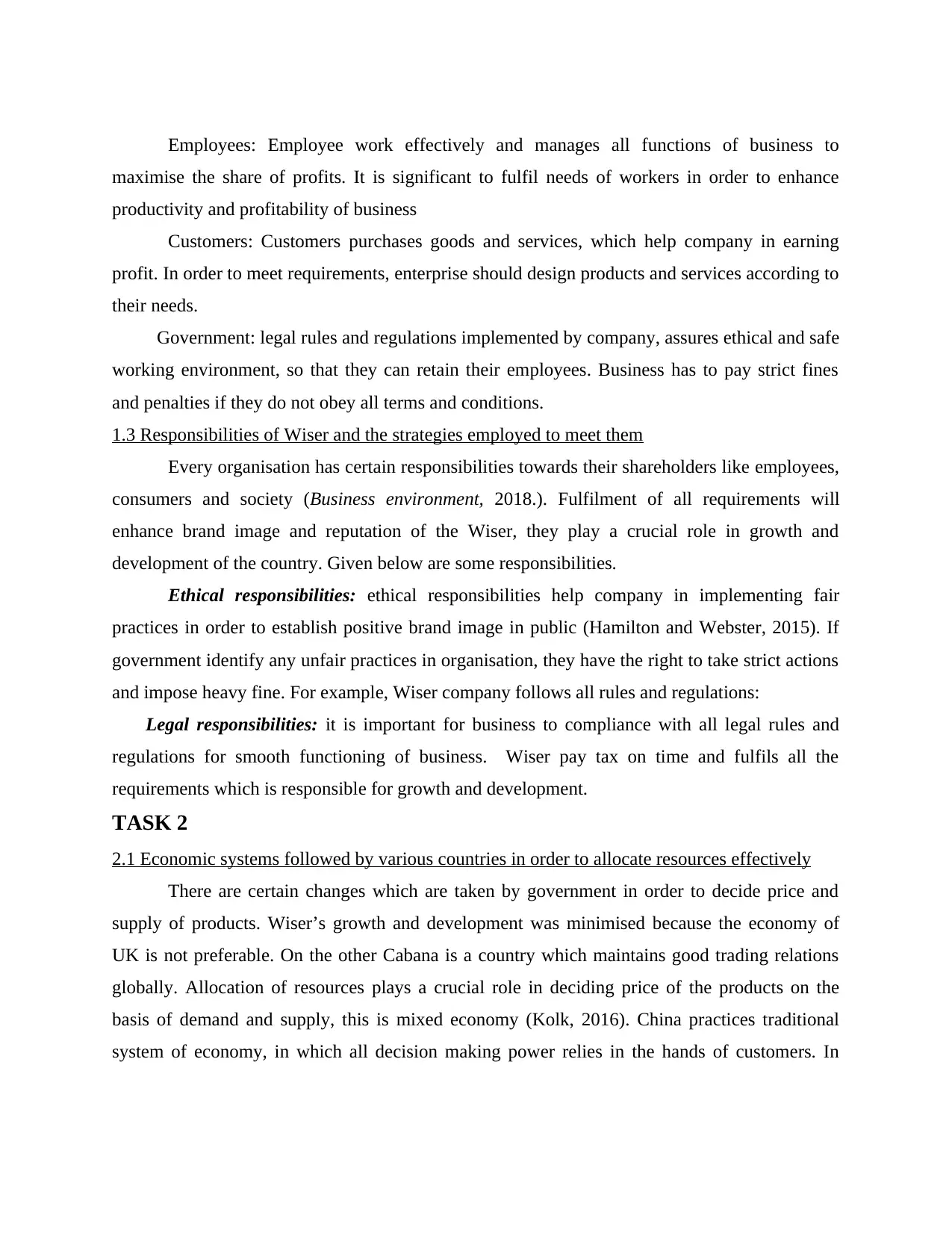
Employees: Employee work effectively and manages all functions of business to
maximise the share of profits. It is significant to fulfil needs of workers in order to enhance
productivity and profitability of business
Customers: Customers purchases goods and services, which help company in earning
profit. In order to meet requirements, enterprise should design products and services according to
their needs.
Government: legal rules and regulations implemented by company, assures ethical and safe
working environment, so that they can retain their employees. Business has to pay strict fines
and penalties if they do not obey all terms and conditions.
1.3 Responsibilities of Wiser and the strategies employed to meet them
Every organisation has certain responsibilities towards their shareholders like employees,
consumers and society (Business environment, 2018.). Fulfilment of all requirements will
enhance brand image and reputation of the Wiser, they play a crucial role in growth and
development of the country. Given below are some responsibilities.
Ethical responsibilities: ethical responsibilities help company in implementing fair
practices in order to establish positive brand image in public (Hamilton and Webster, 2015). If
government identify any unfair practices in organisation, they have the right to take strict actions
and impose heavy fine. For example, Wiser company follows all rules and regulations:
Legal responsibilities: it is important for business to compliance with all legal rules and
regulations for smooth functioning of business. Wiser pay tax on time and fulfils all the
requirements which is responsible for growth and development.
TASK 2
2.1 Economic systems followed by various countries in order to allocate resources effectively
There are certain changes which are taken by government in order to decide price and
supply of products. Wiser’s growth and development was minimised because the economy of
UK is not preferable. On the other Cabana is a country which maintains good trading relations
globally. Allocation of resources plays a crucial role in deciding price of the products on the
basis of demand and supply, this is mixed economy (Kolk, 2016). China practices traditional
system of economy, in which all decision making power relies in the hands of customers. In
maximise the share of profits. It is significant to fulfil needs of workers in order to enhance
productivity and profitability of business
Customers: Customers purchases goods and services, which help company in earning
profit. In order to meet requirements, enterprise should design products and services according to
their needs.
Government: legal rules and regulations implemented by company, assures ethical and safe
working environment, so that they can retain their employees. Business has to pay strict fines
and penalties if they do not obey all terms and conditions.
1.3 Responsibilities of Wiser and the strategies employed to meet them
Every organisation has certain responsibilities towards their shareholders like employees,
consumers and society (Business environment, 2018.). Fulfilment of all requirements will
enhance brand image and reputation of the Wiser, they play a crucial role in growth and
development of the country. Given below are some responsibilities.
Ethical responsibilities: ethical responsibilities help company in implementing fair
practices in order to establish positive brand image in public (Hamilton and Webster, 2015). If
government identify any unfair practices in organisation, they have the right to take strict actions
and impose heavy fine. For example, Wiser company follows all rules and regulations:
Legal responsibilities: it is important for business to compliance with all legal rules and
regulations for smooth functioning of business. Wiser pay tax on time and fulfils all the
requirements which is responsible for growth and development.
TASK 2
2.1 Economic systems followed by various countries in order to allocate resources effectively
There are certain changes which are taken by government in order to decide price and
supply of products. Wiser’s growth and development was minimised because the economy of
UK is not preferable. On the other Cabana is a country which maintains good trading relations
globally. Allocation of resources plays a crucial role in deciding price of the products on the
basis of demand and supply, this is mixed economy (Kolk, 2016). China practices traditional
system of economy, in which all decision making power relies in the hands of customers. In
Paraphrase This Document
Need a fresh take? Get an instant paraphrase of this document with our AI Paraphraser
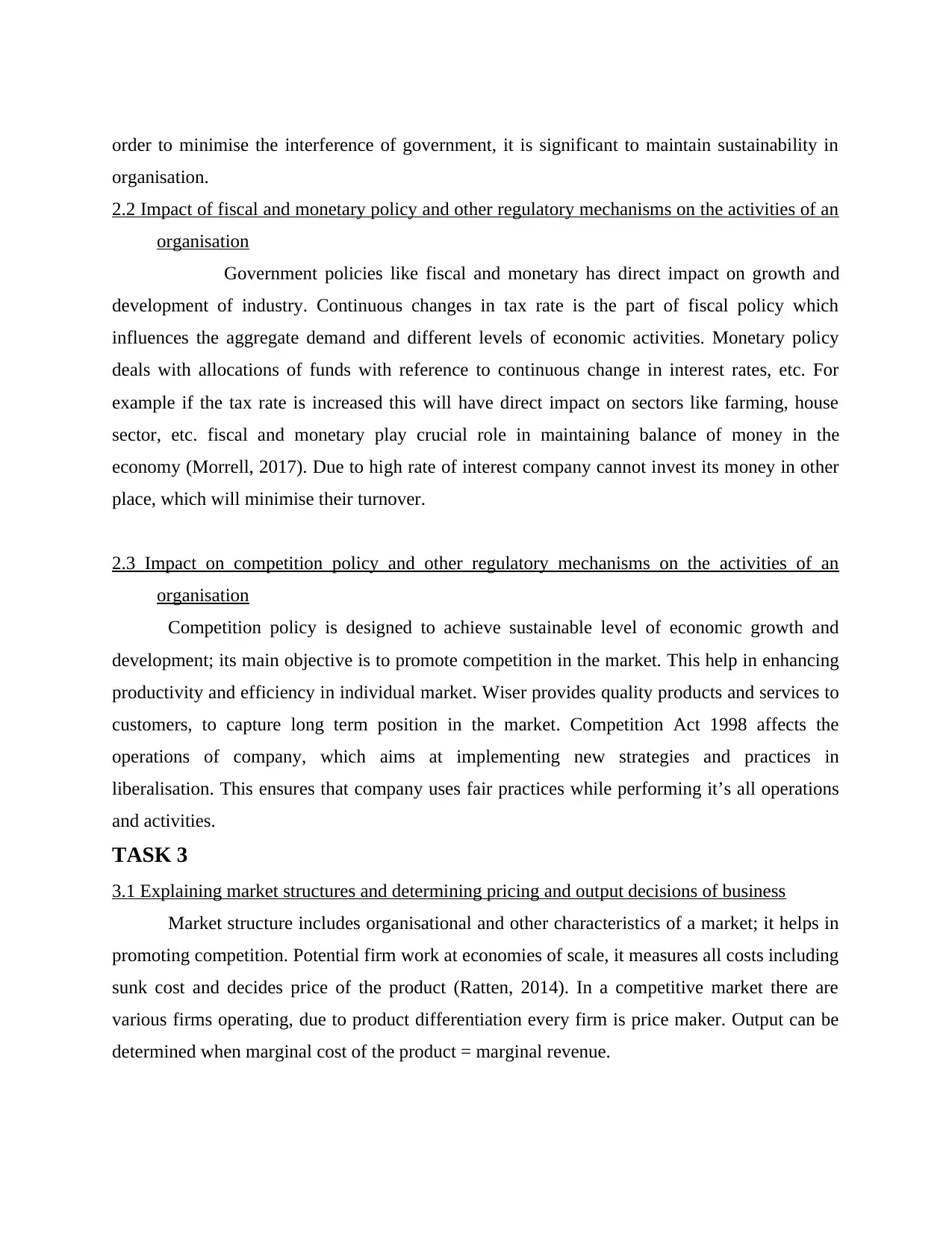
order to minimise the interference of government, it is significant to maintain sustainability in
organisation.
2.2 Impact of fiscal and monetary policy and other regulatory mechanisms on the activities of an
organisation
Government policies like fiscal and monetary has direct impact on growth and
development of industry. Continuous changes in tax rate is the part of fiscal policy which
influences the aggregate demand and different levels of economic activities. Monetary policy
deals with allocations of funds with reference to continuous change in interest rates, etc. For
example if the tax rate is increased this will have direct impact on sectors like farming, house
sector, etc. fiscal and monetary play crucial role in maintaining balance of money in the
economy (Morrell, 2017). Due to high rate of interest company cannot invest its money in other
place, which will minimise their turnover.
2.3 Impact on competition policy and other regulatory mechanisms on the activities of an
organisation
Competition policy is designed to achieve sustainable level of economic growth and
development; its main objective is to promote competition in the market. This help in enhancing
productivity and efficiency in individual market. Wiser provides quality products and services to
customers, to capture long term position in the market. Competition Act 1998 affects the
operations of company, which aims at implementing new strategies and practices in
liberalisation. This ensures that company uses fair practices while performing it’s all operations
and activities.
TASK 3
3.1 Explaining market structures and determining pricing and output decisions of business
Market structure includes organisational and other characteristics of a market; it helps in
promoting competition. Potential firm work at economies of scale, it measures all costs including
sunk cost and decides price of the product (Ratten, 2014). In a competitive market there are
various firms operating, due to product differentiation every firm is price maker. Output can be
determined when marginal cost of the product = marginal revenue.
organisation.
2.2 Impact of fiscal and monetary policy and other regulatory mechanisms on the activities of an
organisation
Government policies like fiscal and monetary has direct impact on growth and
development of industry. Continuous changes in tax rate is the part of fiscal policy which
influences the aggregate demand and different levels of economic activities. Monetary policy
deals with allocations of funds with reference to continuous change in interest rates, etc. For
example if the tax rate is increased this will have direct impact on sectors like farming, house
sector, etc. fiscal and monetary play crucial role in maintaining balance of money in the
economy (Morrell, 2017). Due to high rate of interest company cannot invest its money in other
place, which will minimise their turnover.
2.3 Impact on competition policy and other regulatory mechanisms on the activities of an
organisation
Competition policy is designed to achieve sustainable level of economic growth and
development; its main objective is to promote competition in the market. This help in enhancing
productivity and efficiency in individual market. Wiser provides quality products and services to
customers, to capture long term position in the market. Competition Act 1998 affects the
operations of company, which aims at implementing new strategies and practices in
liberalisation. This ensures that company uses fair practices while performing it’s all operations
and activities.
TASK 3
3.1 Explaining market structures and determining pricing and output decisions of business
Market structure includes organisational and other characteristics of a market; it helps in
promoting competition. Potential firm work at economies of scale, it measures all costs including
sunk cost and decides price of the product (Ratten, 2014). In a competitive market there are
various firms operating, due to product differentiation every firm is price maker. Output can be
determined when marginal cost of the product = marginal revenue.
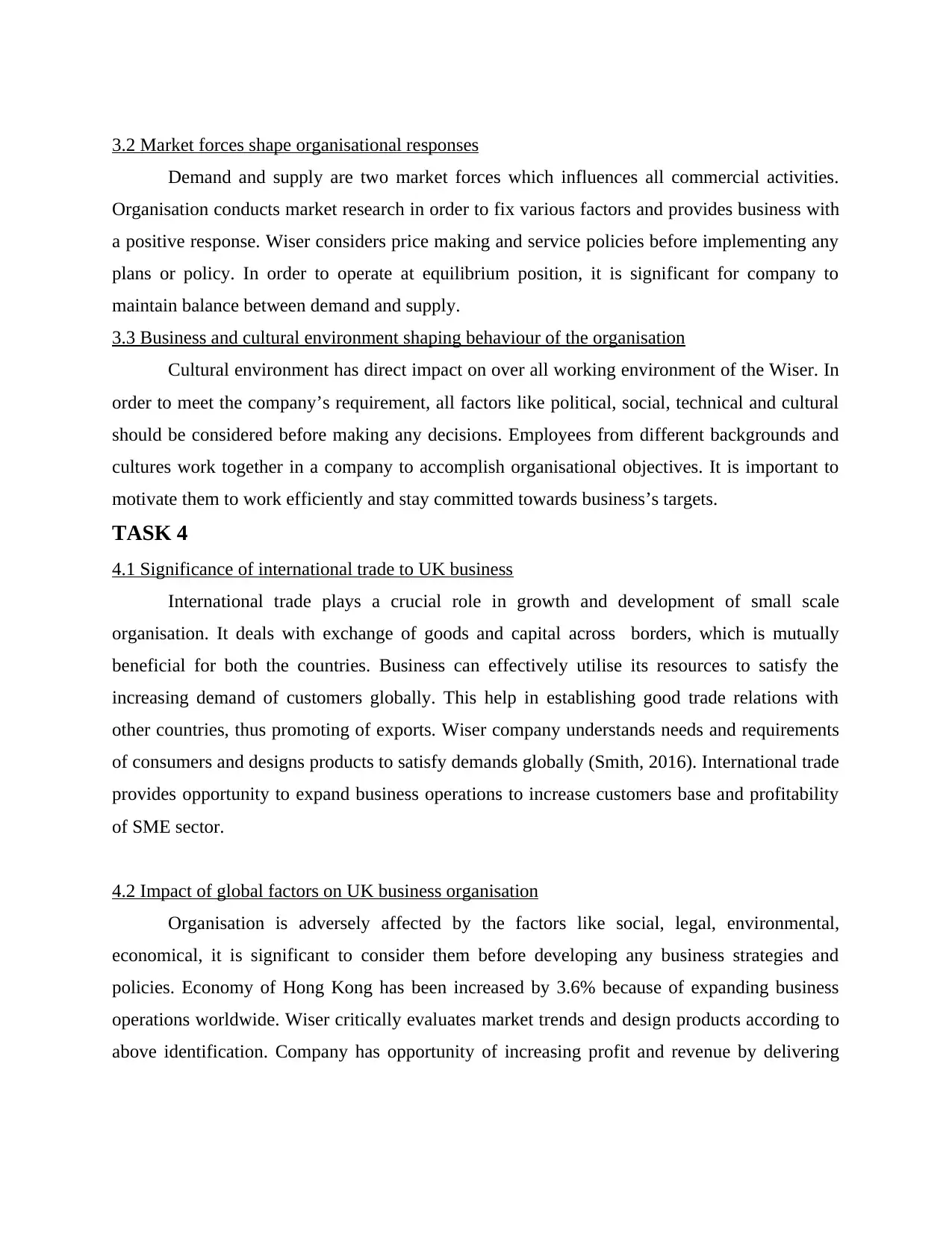
3.2 Market forces shape organisational responses
Demand and supply are two market forces which influences all commercial activities.
Organisation conducts market research in order to fix various factors and provides business with
a positive response. Wiser considers price making and service policies before implementing any
plans or policy. In order to operate at equilibrium position, it is significant for company to
maintain balance between demand and supply.
3.3 Business and cultural environment shaping behaviour of the organisation
Cultural environment has direct impact on over all working environment of the Wiser. In
order to meet the company’s requirement, all factors like political, social, technical and cultural
should be considered before making any decisions. Employees from different backgrounds and
cultures work together in a company to accomplish organisational objectives. It is important to
motivate them to work efficiently and stay committed towards business’s targets.
TASK 4
4.1 Significance of international trade to UK business
International trade plays a crucial role in growth and development of small scale
organisation. It deals with exchange of goods and capital across borders, which is mutually
beneficial for both the countries. Business can effectively utilise its resources to satisfy the
increasing demand of customers globally. This help in establishing good trade relations with
other countries, thus promoting of exports. Wiser company understands needs and requirements
of consumers and designs products to satisfy demands globally (Smith, 2016). International trade
provides opportunity to expand business operations to increase customers base and profitability
of SME sector.
4.2 Impact of global factors on UK business organisation
Organisation is adversely affected by the factors like social, legal, environmental,
economical, it is significant to consider them before developing any business strategies and
policies. Economy of Hong Kong has been increased by 3.6% because of expanding business
operations worldwide. Wiser critically evaluates market trends and design products according to
above identification. Company has opportunity of increasing profit and revenue by delivering
Demand and supply are two market forces which influences all commercial activities.
Organisation conducts market research in order to fix various factors and provides business with
a positive response. Wiser considers price making and service policies before implementing any
plans or policy. In order to operate at equilibrium position, it is significant for company to
maintain balance between demand and supply.
3.3 Business and cultural environment shaping behaviour of the organisation
Cultural environment has direct impact on over all working environment of the Wiser. In
order to meet the company’s requirement, all factors like political, social, technical and cultural
should be considered before making any decisions. Employees from different backgrounds and
cultures work together in a company to accomplish organisational objectives. It is important to
motivate them to work efficiently and stay committed towards business’s targets.
TASK 4
4.1 Significance of international trade to UK business
International trade plays a crucial role in growth and development of small scale
organisation. It deals with exchange of goods and capital across borders, which is mutually
beneficial for both the countries. Business can effectively utilise its resources to satisfy the
increasing demand of customers globally. This help in establishing good trade relations with
other countries, thus promoting of exports. Wiser company understands needs and requirements
of consumers and designs products to satisfy demands globally (Smith, 2016). International trade
provides opportunity to expand business operations to increase customers base and profitability
of SME sector.
4.2 Impact of global factors on UK business organisation
Organisation is adversely affected by the factors like social, legal, environmental,
economical, it is significant to consider them before developing any business strategies and
policies. Economy of Hong Kong has been increased by 3.6% because of expanding business
operations worldwide. Wiser critically evaluates market trends and design products according to
above identification. Company has opportunity of increasing profit and revenue by delivering
⊘ This is a preview!⊘
Do you want full access?
Subscribe today to unlock all pages.

Trusted by 1+ million students worldwide
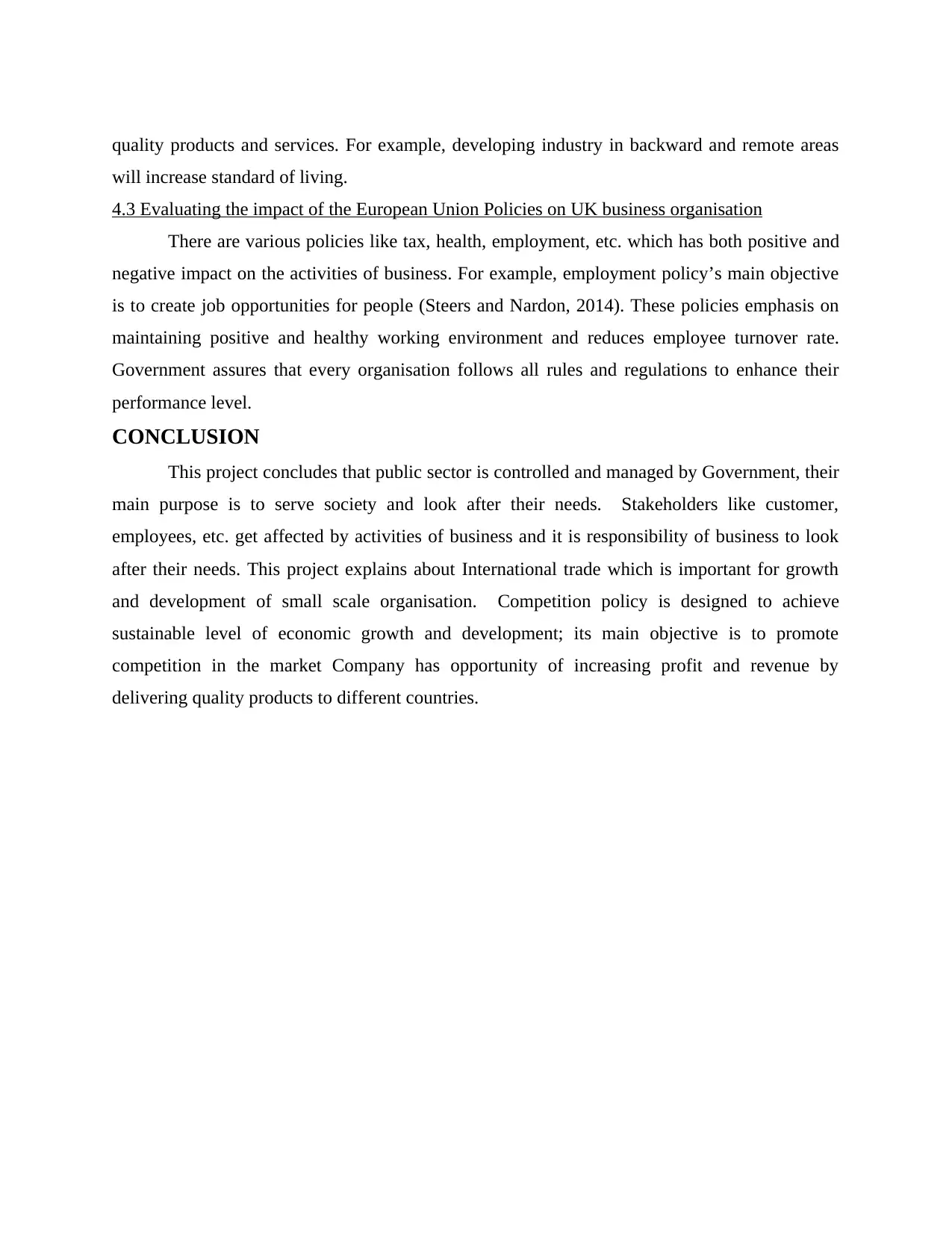
quality products and services. For example, developing industry in backward and remote areas
will increase standard of living.
4.3 Evaluating the impact of the European Union Policies on UK business organisation
There are various policies like tax, health, employment, etc. which has both positive and
negative impact on the activities of business. For example, employment policy’s main objective
is to create job opportunities for people (Steers and Nardon, 2014). These policies emphasis on
maintaining positive and healthy working environment and reduces employee turnover rate.
Government assures that every organisation follows all rules and regulations to enhance their
performance level.
CONCLUSION
This project concludes that public sector is controlled and managed by Government, their
main purpose is to serve society and look after their needs. Stakeholders like customer,
employees, etc. get affected by activities of business and it is responsibility of business to look
after their needs. This project explains about International trade which is important for growth
and development of small scale organisation. Competition policy is designed to achieve
sustainable level of economic growth and development; its main objective is to promote
competition in the market Company has opportunity of increasing profit and revenue by
delivering quality products to different countries.
will increase standard of living.
4.3 Evaluating the impact of the European Union Policies on UK business organisation
There are various policies like tax, health, employment, etc. which has both positive and
negative impact on the activities of business. For example, employment policy’s main objective
is to create job opportunities for people (Steers and Nardon, 2014). These policies emphasis on
maintaining positive and healthy working environment and reduces employee turnover rate.
Government assures that every organisation follows all rules and regulations to enhance their
performance level.
CONCLUSION
This project concludes that public sector is controlled and managed by Government, their
main purpose is to serve society and look after their needs. Stakeholders like customer,
employees, etc. get affected by activities of business and it is responsibility of business to look
after their needs. This project explains about International trade which is important for growth
and development of small scale organisation. Competition policy is designed to achieve
sustainable level of economic growth and development; its main objective is to promote
competition in the market Company has opportunity of increasing profit and revenue by
delivering quality products to different countries.
Paraphrase This Document
Need a fresh take? Get an instant paraphrase of this document with our AI Paraphraser
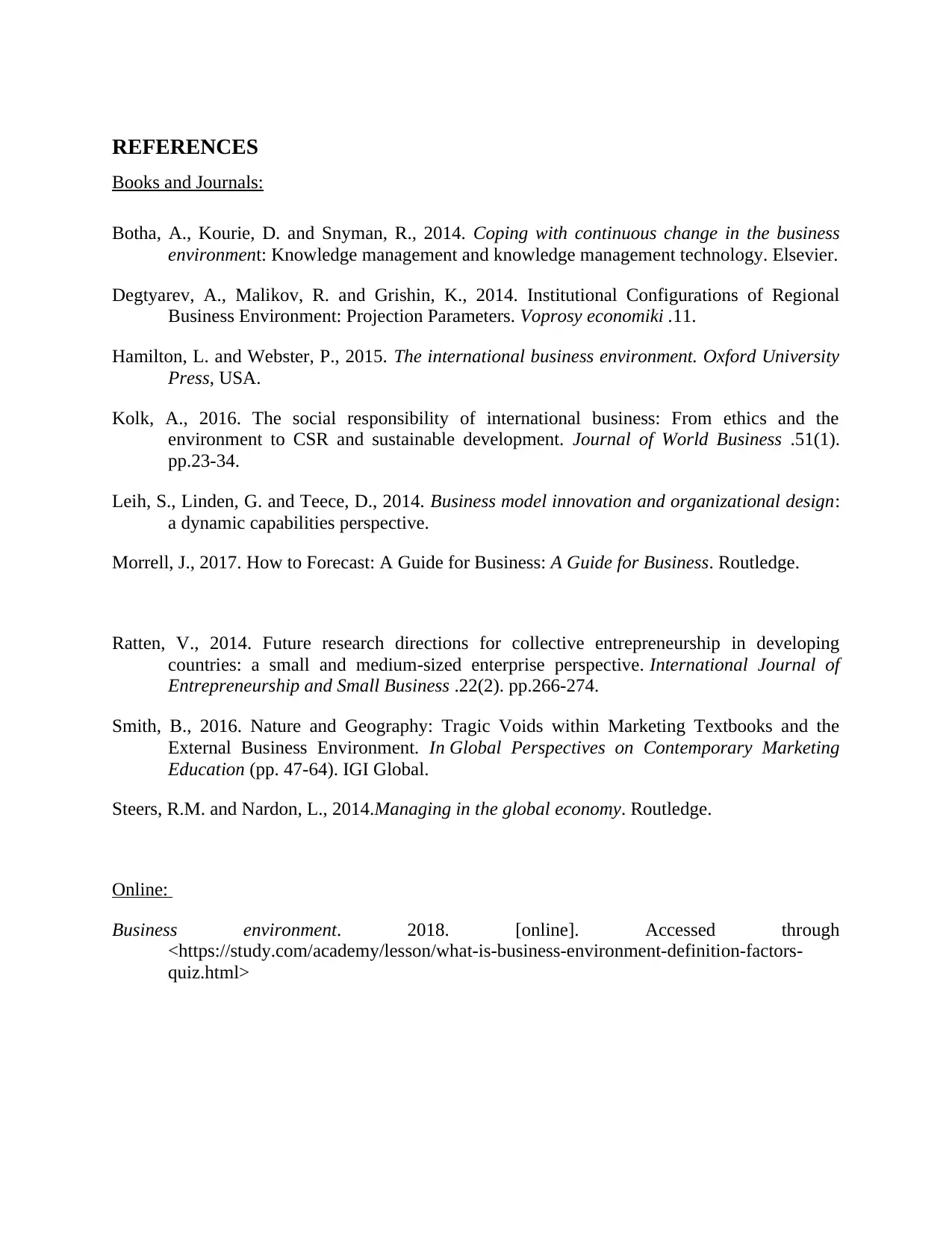
REFERENCES
Books and Journals:
Botha, A., Kourie, D. and Snyman, R., 2014. Coping with continuous change in the business
environment: Knowledge management and knowledge management technology. Elsevier.
Degtyarev, A., Malikov, R. and Grishin, K., 2014. Institutional Configurations of Regional
Business Environment: Projection Parameters. Voprosy economiki .11.
Hamilton, L. and Webster, P., 2015. The international business environment. Oxford University
Press, USA.
Kolk, A., 2016. The social responsibility of international business: From ethics and the
environment to CSR and sustainable development. Journal of World Business .51(1).
pp.23-34.
Leih, S., Linden, G. and Teece, D., 2014. Business model innovation and organizational design:
a dynamic capabilities perspective.
Morrell, J., 2017. How to Forecast: A Guide for Business: A Guide for Business. Routledge.
Ratten, V., 2014. Future research directions for collective entrepreneurship in developing
countries: a small and medium-sized enterprise perspective. International Journal of
Entrepreneurship and Small Business .22(2). pp.266-274.
Smith, B., 2016. Nature and Geography: Tragic Voids within Marketing Textbooks and the
External Business Environment. In Global Perspectives on Contemporary Marketing
Education (pp. 47-64). IGI Global.
Steers, R.M. and Nardon, L., 2014.Managing in the global economy. Routledge.
Online:
Business environment. 2018. [online]. Accessed through
<https://study.com/academy/lesson/what-is-business-environment-definition-factors-
quiz.html>
Books and Journals:
Botha, A., Kourie, D. and Snyman, R., 2014. Coping with continuous change in the business
environment: Knowledge management and knowledge management technology. Elsevier.
Degtyarev, A., Malikov, R. and Grishin, K., 2014. Institutional Configurations of Regional
Business Environment: Projection Parameters. Voprosy economiki .11.
Hamilton, L. and Webster, P., 2015. The international business environment. Oxford University
Press, USA.
Kolk, A., 2016. The social responsibility of international business: From ethics and the
environment to CSR and sustainable development. Journal of World Business .51(1).
pp.23-34.
Leih, S., Linden, G. and Teece, D., 2014. Business model innovation and organizational design:
a dynamic capabilities perspective.
Morrell, J., 2017. How to Forecast: A Guide for Business: A Guide for Business. Routledge.
Ratten, V., 2014. Future research directions for collective entrepreneurship in developing
countries: a small and medium-sized enterprise perspective. International Journal of
Entrepreneurship and Small Business .22(2). pp.266-274.
Smith, B., 2016. Nature and Geography: Tragic Voids within Marketing Textbooks and the
External Business Environment. In Global Perspectives on Contemporary Marketing
Education (pp. 47-64). IGI Global.
Steers, R.M. and Nardon, L., 2014.Managing in the global economy. Routledge.
Online:
Business environment. 2018. [online]. Accessed through
<https://study.com/academy/lesson/what-is-business-environment-definition-factors-
quiz.html>

⊘ This is a preview!⊘
Do you want full access?
Subscribe today to unlock all pages.

Trusted by 1+ million students worldwide
1 out of 9
Related Documents
Your All-in-One AI-Powered Toolkit for Academic Success.
+13062052269
info@desklib.com
Available 24*7 on WhatsApp / Email
![[object Object]](/_next/static/media/star-bottom.7253800d.svg)
Unlock your academic potential
Copyright © 2020–2026 A2Z Services. All Rights Reserved. Developed and managed by ZUCOL.





